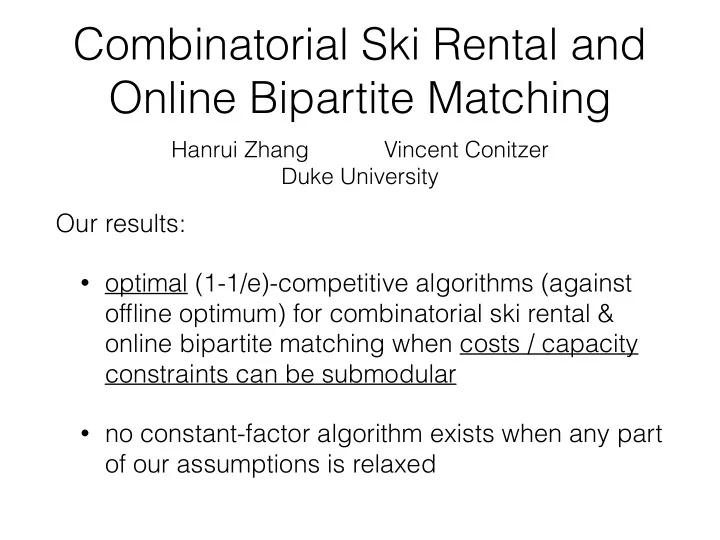

Combinatorial Ski Rental and Online Bipartite Matching Hanrui Zhang Vincent Conitzer Duke University Our results: • optimal (1-1/e)-competitive algorithms (against offline optimum) for combinatorial ski rental & online bipartite matching when costs / capacity constraints can be submodular • no constant-factor algorithm exists when any part of our assumptions is relaxed
Combinatorial ski rental time • a business analyst’s job involves 2 software products: Excel and Powerpoint 1st task requires: rent Excel at cost $10, cost so far: $10 • tasks arrive over time, each of which may product(s) purchased: require either / both of the 2 products • in order to finish all tasks, analyst may "rent" or 2nd task requires: "buy" any combination of the products; rent both at cost $15, cost so far: $25 purchased products cannot be returned product(s) purchased: • discounts are available when renting or buying both products 3rd task requires: buy Excel at cost $30, cost so far: $55 product(s) purchased: cost of purchasing: $30 $30 4th task requires: rent Powerpoint at cost $10, cost so far: $65 $50 product(s) purchased: cost of renting: 5th task requires: buy Powerpoint at (marginal) cost $20, cost so far: $85 $30 $30 product(s) purchased: $50 both products purchased "upgrading" is allowed: pay future cost = 0 $20 for Powerpoint when Excel is already purchased
Primal LP for ski rental Dual LP for online matching • n offline vertices, one online vertex at each • n products available for purchasing / renting time t • f(S): cost of purchasing S • λ t (i): fraction of online vertex arriving at time t matched to offline vertex i • g t (S): cost of renting S at time t • maximize: • x(S) ≥ 0: probability of purchasing S total (fractional) number of online Σ 1 ≤ t ≤ T Σ 1 ≤ i ≤ n λ t (i) vertices matched • y t (S) ≥ 0: probability of renting S at time t • s.t. (offline capacity constraints) for every set of items S: • minimize: total load of all offline vertices Σ 1 ≤ t ≤ T Σ i ∈ S λ t (i) ≤ f(S) in S cannot Σ S x(S) f(S) + Σ 1 ≤ t ≤ T Σ S’ y t (S’) g t (S’) exceed f(S) • s.t. (online supply constraints) for every set of • s.t. for all item i, time t: items S, time t: fraction of online vertex at time t matched to Σ S: i ∈ S x(S) + y t (S) ≥ 1 Σ i ∈ S λ t (i) ≤ g t (S) offline vertices in S cannot exceed g t (S) take-home message: online primal-dual analysis can go fully combinatorial
• lemma: under certain conditions , local constraints Sketch of algorithm satisfied imply global constraints satisfied & small ratio between primal / dual objectives • minimize: Σ S x(S) f(S) + Σ 1 ≤ t ≤ T Σ S' y t (S') g t (S') • problem boils down to local task: setting λ t (i) • s.t. for all i, t: Σ S: i ∈ S x(S) + y t (S) ≥ 1 (which determine x t (i)) to satisfy these certain conditions at each time t • in constraints: only marginal probabilities matter • relatively easy when x t (i) are all different, highly nontrivial (and combinatorial) otherwise; latter • re-parametrize by marginal probabilities (hard) case is not "zero-measure" • consider convex envelope = Lovasz extension Overview of lower bounds no constant-factor algorithm if: primal: • cost of purchasing is allowed to be XOS, • minimize: F(x t (1), …, x t (n)) + Σ 1 ≤ t ≤ T G t (y t (1), … y t (n)) • cost of renting is allowed to be supermodular, or dual: • upgrading is not allowed (i.e., price of • maximize: Σ 1 ≤ t ≤ T Σ 1 ≤ i ≤ n λ t (i) purchasing S given S' is f(S) rather than f(S | S')) • s.t. for all S: Σ 1 ≤ t ≤ T Σ i ∈ S λ t (i) ≤ f(S) in words: all our assumptions are necessary • s.t. for all S, t: Σ i ∈ S λ t (i) ≤ g t (S) symmetrization tecinque: prepare future clauses, choose realization by demanding right copy of item new problem: global objective & constraints
Recommend
More recommend